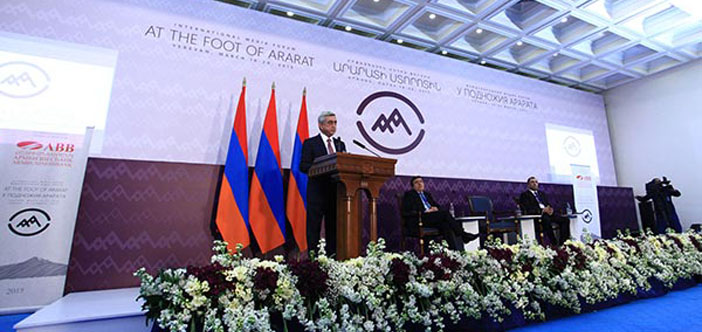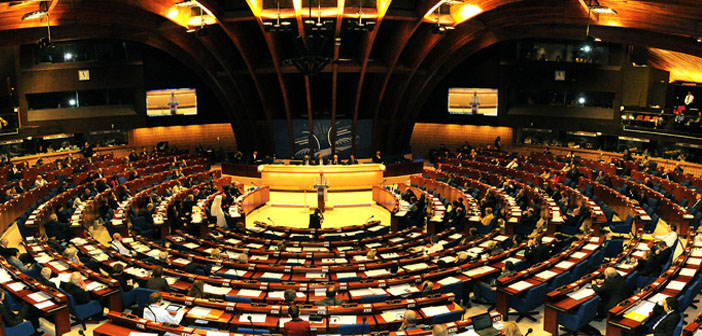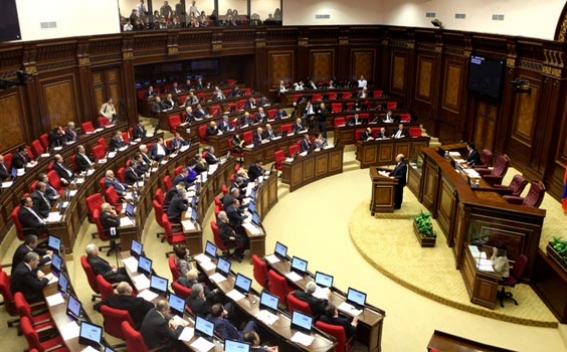The international media forum titled ‘At the Foot of Mount Ararat’ held in Yerevan on 18-20 March, brought together journalists from various countries with President of Armenia Serzh Sargsyan, and also many state officials.
On the first day of the forum, the Centennial of the Armenian Genocide was discussed under the motto ‘I Remember and Demand’ under the headings of remembrance, gratitude, recognition and renaissance. In his speech, President Sargsyan underlined that the psychological, political, cultural and linguistic effects of the Genocide on Armenians continued for 100 years. Sargsyan, who responded with an official letter to President Recep Tayyip Erdoğan’s invitation to the commemoration on April 24 of the Dardanelles War, and later withdrew from Parliament the protocols Armenia signed in 2009 with Turkey, stated that this step was not a legal but political one, and that they had not completely closed doors with Turkey.
‘Society is changing, but the State’s mentality remains the same’
Diaspora Minister Hranush Hakobyan, in her speech, spoke of the formation and scope of ‘Diaspora’ and shared the expectations of Armenia and the Diaspora from each other. Hakobyan stated that 77 thousand children were orphaned, and 300 thousand children had been Islamised after 1915, and that around 7 million Armenians lived in the Diaspora, and along with Islamised Armenians, around 3 million Armenians lived in Turkey. Hakobyan emphasized that justice had to be secured regarding the Genocide, and said, ‘Armenians will struggle for the recognition of the Genocide, because without recognition, whenever they remember their ancestors they will feel threatened’. Hakobyan stated that society in Turkey had begun to change, but that the mentality of the State remained the same; underlining that to prevent the repetition of crimes against humanity, the perpetrators had to be punished, reminding the audience that justice had still not been secured in the Hrant Dink murder case either.
‘Armenia seeks no preconditions’
President of the Coordination Team of the Centennial events, the President’s Chief of Staff Vigen Sargsyan, emphasized that the courage civil society in Turkey will display to unearth the historical truth was very important in the recognition of the Genocide. Sargsyan stated that an international struggle against crimes against humanity was necessary, adding that Armenia had never put forth preconditions in the normalization process of Armenia-Turkey relations.
We had the opportunity to interview Sargsyan after the meeting, and in his statement to Agos, Sargsyan described President Recep Tayyip Erdoğan announcement that the Dardanelles War would be commemorated on April 24 as comical, adding ‘To celebrate a victory at war on April 24, accepted universally as the day when the victims of the Armenian Genocide are commemorated, or even to commemorate that war, is not acceptable. It is comical to invite the President of Armenia to celebrate a victory. Let the State of Turkey decide itself whether this befits dignity’.
‘Any condolence for the Genocide must come from the heart’
Sargsyan went on to say the following regarding the then Prime Minister Recep Tayyip Erdoğan’s condolence message on April 24: ‘I perceive that statement not as a condolence message, but as a more sophisticated version of denial. Not because the word Genocide is not used in the message, but because it prefers to commemorate the perpetrators and victims at the same time, and to treat them at the same level. Any condolence message for the Genocide must come from the heart, must be a matter of conscience, it can only be done by understanding all the effects of this massacre on the Armenian people and civilisation. On the other hand, the only closed border in the European continent is the Armenia-Turkey border. The closed border stifles all potential positive steps. The opening of the border is normalization. All its positive consequences will follow. The opening of the border will increase communication from human to human.’
‘Istanbul Church bells must ring on April 23’
In response to Agos’s question regarding Armenians living in Turkey, Sargsyan stated that it was a highly important development that people who for many years concealed their Armenian identity openly expressed themselves today. Sargsyan added, ‘That in recent years Islamised, or forcibly Islamised Armenians have openly expressed themselves is significant progress. This means that Armenians and other minorities in Turkey, who have put up a struggle for dignity and equal citizenship, have begun to win emancipation. For me, an important test would be for the Armenian Church in Istanbul to commemorate the victims of the Genocide on April 23, and to ring its bells in their memory’.





